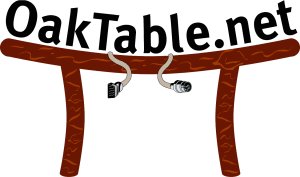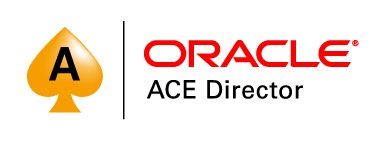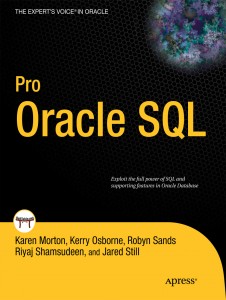Just a quick post on a new Exadata feature called Zone Maps. They’re similar to storage indexes on Exadata, but with more control (you can define the columns and how the data is refreshed for example). People have complained for years that storage indexes provided no control mechanisms, but now we have a way to exert our God given rights as DBA’s to control yet another aspect of the database. Here’s a link to the 12.1.0.2 documentation which resides in the Data Warehousing Guide: Zone Map Documentation
Zone Maps are restricted to Exadata storage by the way (well probably they work on ZFS and Pillar too). Have a look at the Oracle error messages file:
>grep -i "storage type" $ORACLE_HOME/rdbms/mesg/oraus.msg | grep -i "not supported"
/u01/app/oracle/product/12.1.0.2/dbhome_1/rdbms/mesg/oraus.msg:31969, 00000, "ZONEMAP not supported for table stored in tablespace of this storage type"
/u01/app/oracle/product/12.1.0.2/dbhome_1/rdbms/mesg/oraus.msg:64307, 00000, " Exadata Hybrid Columnar Compression is not supported for tablespaces on this storage type"
/u01/app/oracle/product/12.1.0.2/dbhome_1/rdbms/mesg/oraus.msg:64309, 00000, " Hybrid Columnar Compression with row-level locking is not supported for tablespaces on this storage type."
/u01/app/oracle/product/12.1.0.2/dbhome_1/rdbms/mesg/oraus.msg:65425, 00000, "CLUSTERING clause not supported for table stored in tablespace of this storage type"
/u01/app/oracle/product/12.1.0.2/dbhome_1/rdbms/mesg/oraus.msg:65451, 00000, "Advanced index compression is not supported for tablespaces on this storage type."
So according to the messages file, there are a handful of features that are restricted in this fashion (Zone Maps, HCC, Attribute Clustering and Advanced Index Compression).
As a bit of totally irrelevant history, zone maps were actually included in the 12.1.0.1 release, but the documentation on them was removed. So they worked, but they were undocumented.
Here’s an example on a 12.1.0.1 DB on a non-Exadata platform.
SQL*Plus: Release 12.1.0.1.0 Production on Wed Aug 13 15:41:46 2014
Copyright (c) 1982, 2013, Oracle. All rights reserved.
Connected to:
Oracle Database 12c Enterprise Edition Release 12.1.0.1.0 - 64bit Production
With the Partitioning, Automatic Storage Management, OLAP, Advanced Analytics
and Real Application Testing options
INSTANCE_NAME STARTUP_TIME CURRENT_TIME DAYS SECONDS
---------------- ----------------- ----------------- ------- ----------
LAB1211 13-AUG-2014 09:54 13-AUG-2014 15:41 .24 20820
SYS@LAB1211> create table kso.junk1 (col1 number, col2 number) clustering by linear order (col1,col2);
create table kso.junk1 (col1 number, col2 number) clustering by linear order (col1,col2)
*
ERROR at line 1:
ORA-65425: CLUSTERING clause not supported for table stored in tablespace of this storage type
SYS@LAB1211> create table kso.junk1 (col1 number, col2 number);
Table created.
SYS@LAB1211> create materialized zonemap skew_zonemap on kso.junk1(col1);
create materialized zonemap skew_zonemap on kso.junk1(col1)
*
ERROR at line 1:
ORA-31969: ZONEMAP not supported for table stored in tablespace of this storage type
Note that both zone maps and attribute clustering were disallowed with the “not supported for table stored in tablespace of this storage type” error message.
By the way, attribute clustering is another interesting new feature of 12g that allows you to declaratively instruct Oracle to store data on disk in a sorted order. This physical ordering can have big benefit for storage indexes or zone maps (or any btree index where clustering factor is important for that matter). Oracle’s new In-Memory column store also has a min/max pruning feature (storage indexes) which means physical ordering on disk is important with that feature as well.
Anyway, here’s a link to the 12.1.0.2 documentation on attribute clustering which also resides in the Data Warehousing Guide: Attribute Clustering Documentation
And here’s another example using 12.1.0.2 on an Exadata.
SQL*Plus: Release 12.1.0.2.0 Production on Wed Aug 13 15:42:18 2014
Copyright (c) 1982, 2014, Oracle. All rights reserved.
Connected to:
Oracle Database 12c Enterprise Edition Release 12.1.0.2.0 - 64bit Production
With the Partitioning, Automatic Storage Management, OLAP, Advanced Analytics
and Real Application Testing options
INSTANCE_NAME STARTUP_TIME CURRENT_TIME DAYS SECONDS
---------------- ----------------- ----------------- ------- ----------
INMEM 24-JUL-2014 18:35 13-AUG-2014 15:42 19.88 1717600
Elapsed: 00:00:00.00
SYS@INMEM> @test_zonemap
SYS@INMEM> create table kso.junk1 (col1 number, col2 number) clustering by linear order (col1,col2);
Table created.
Elapsed: 00:00:00.01
SYS@INMEM> create materialized zonemap skew_zonemap on kso.junk1(col1);
Materialized zonemap created.
Elapsed: 00:00:00.15
SYS@INMEM>
SYS@INMEM> -- so as expected, we're able to create an attribute clustered table and a zone map on Exadata
SYS@INMEM>
SYS@INMEM> -- Let's try creating a tablespace that is not on Exa storage (even though the DB is on EXA platform)
SYS@INMEM>
SYS@INMEM> create tablespace KSO_NON_EXA datafile '/home/oracle/KSO_NON_EXA.dbf' size 100M;
Tablespace created.
Elapsed: 00:00:00.38
SYS@INMEM> @tablespaces
TABLESPACE_NAME STATUS CONTENTS LOGGING EXTENT_MGT ALLOC_TYP SPACE_MGT BLOCK_SIZE PREDICA
--------------- --------- --------- --------- ---------- --------- --------- ---------- -------
CLASS_DATA ONLINE PERMANENT LOGGING LOCAL SYSTEM AUTO 8192 STORAGE
EXAMPLE ONLINE PERMANENT NOLOGGING LOCAL SYSTEM AUTO 8192 STORAGE
KSO_NON_EXA ONLINE PERMANENT LOGGING LOCAL SYSTEM AUTO 8192 HOST <===
SYSAUX ONLINE PERMANENT LOGGING LOCAL SYSTEM AUTO 8192 STORAGE
SYSTEM ONLINE PERMANENT LOGGING LOCAL SYSTEM MANUAL 8192 STORAGE
TEMP ONLINE TEMPORARY NOLOGGING LOCAL UNIFORM MANUAL 8192 STORAGE
UNDOTBS1 ONLINE UNDO LOGGING LOCAL SYSTEM MANUAL 8192 STORAGE
USERS ONLINE PERMANENT LOGGING LOCAL SYSTEM AUTO 8192 STORAGE
8 rows selected.
Elapsed: 00:00:00.02
SYS@INMEM>
SYS@INMEM> -- note that tablespace KSO_NON_EXA is on local disk, not Exadata storage servers, so PREDICATE_EVALUATION is set to HOST.
SYS@INMEM>
SYS@INMEM> drop table kso.junk1;
Table dropped.
Elapsed: 00:00:00.01
SYS@INMEM> create table kso.junk1 (col1 number, col2 number) clustering by linear order (col1,col2) tablespace kso_non_exa;
Table created.
Elapsed: 00:00:00.01
SYS@INMEM> select owner, table_name, tablespace_name from dba_tables where table_name like 'JUNK1';
OWNER TABLE_NAME TABLESPACE_NAME
-------------------- ------------------------------ ---------------
KSO JUNK1 KSO_NON_EXA
Elapsed: 00:00:00.01
SYS@INMEM>
SYS@INMEM> -- wow - that's a bit of a surprise, clustered table create worked on non-Exa storage
SYS@INMEM> -- maybe the check is done on some other level than the tablespace
SYS@INMEM>
SYS@INMEM> create materialized zonemap skew_zonemap on kso.junk1(col1);
create materialized zonemap skew_zonemap on kso.junk1(col1)
*
ERROR at line 1:
ORA-31969: ZONEMAP not supported for table stored in tablespace of this storage type
Elapsed: 00:00:00.00
So as you can see, attempting to create the zone map on non-Exa storage failed as expected. But I was able to create a clustered table on non-Exa storage, which is a little weird. So while the error message for attribute clustering exists in the messages file, it doesn’t appear that there is a check in the code, at least at the tablespace level. I don’t have a 12.1.0.2 install on a non-Exadata platform at the moment to test it out, but if you do, please let me know.
That’s it for now. I hope to do some more detailed posts on In-Memory, Zone Maps, Attribute Clustering in the near future. As always, your comments are welcomed.





